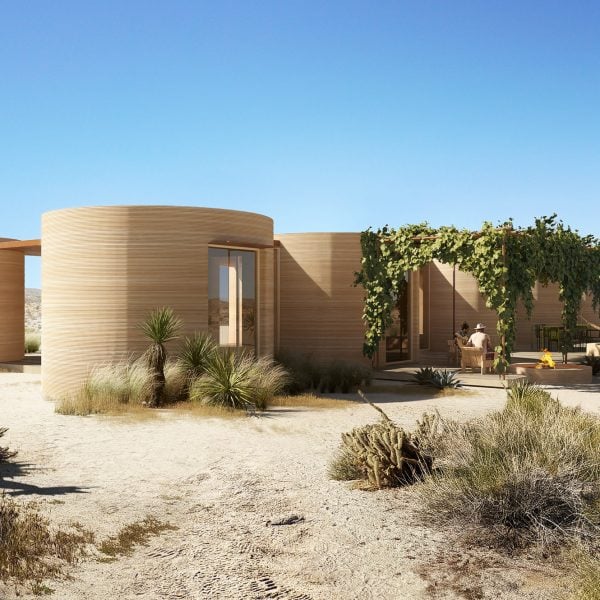[ad_1]
Danish studio BIG and 3D-construction firm ICON are designing a desert campground and housing project called El Cosmico for hotelier Liz Lambert, in Marfa, Texas.
The project for Lambert will cover more than 60 acres in the west Texas town and consist of lodging for the hotel with amenities as well as permanent housing.
Using ICON‘s 3D-printing construction technology, the team designed structures informed by both the desert landscape and BIG‘s work with NASA for moon-based structures.
“We’d spent some time doing research on what construction on Mars and the moon would look like and it was quite clear that additive manufacturing like 3D printing was probably the only viable option,” BIG founder Bjarke Ingels told Dezeen.
“We also already sort of created some visuals where you could see the tectonics of 3D printing combined, in the case of Mars, with the red tones of Martain regoliths, you ended up with something that felt like a kind of vernacular architecture,” he continued.
“The cementitious material of 3D printing created this texture that reminded me of some of the handcrafted teeth details you find on traditional adobe houses.”
This remote approach informed the design of El Cosmico, which because of its remoteness will benefit from ICON’s ability to automate construction.
El Cosmico will have a series of parabolic hut-like structures made with 3D-printed concrete mix that takes pigment that matches that of the desert.
ICON co-founder Jason Ballard believes that the ability of 3D printing to create smooth, organic shapes will give the project a natural appearance.
“Because of 3D printing and robotic approaches to construction, these kinds of living architectures, organic forms, have a much more human aesthetic,” he said.
“So even though it’s made by a robot, it has a much more human aesthetic.”
Also on the property will be a series of homes that are made out of clusters of tube-like shapes grouped together create a series of rooms.
This circular schema will also be applied to the pool on the property, which will be surrounded by a series of curved 3D-printed cabanas.
“We are a little bit at the dawn of 3D printing at the scale of buildings, there’s still a great opportunity to explore what architecture languages can sprout from this new possibility,” Ingels added.
“I think that the whole family of structures that we’ve created for El Cosmico at Marfa is like a first exploration of that emerging vernacular.”
In addition to the hotel, houses and amenities, BIG and ICON have teamed up to create a pavilion and bandstand in Austin for the SXSW festival this year. Made of the same material as El Cosmico, the structure serves as an introduction to those interested in building technology.
While the pavilion is almost complete, the team will break ground on El Cosmico in 2024.
BIG and ICON have collaborated on other projects that test the material, including Wolf Ranch in Georgetown Texas, a 100-home neighbourhood that will be the largest 3D-printed community in the world.
Lambert is known for creating hotels like the renovated Austin Motel and for her work with the prefabricated shelter company Jupe.
[ad_2]

